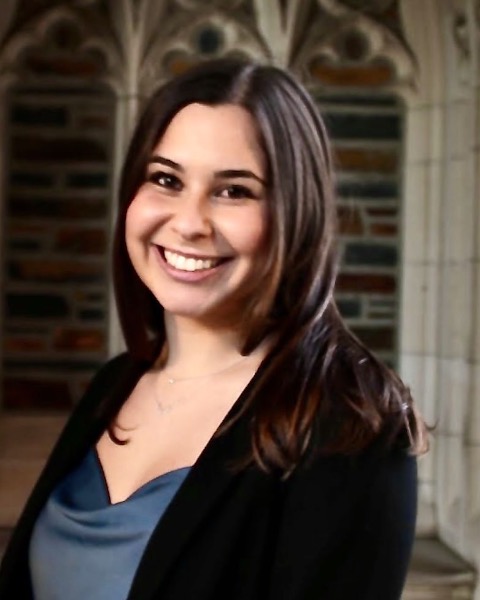Developmental and Behavioral Pediatrics: Autism
Category: Abstract Submission
Developmental and Behavioral Pediatrics: Equity
60 - Ensuring Equity in Early Childhood Autism Spectrum Disorder Services in North Carolina
Saturday, April 23, 2022
3:30 PM - 6:00 PM US MT
Poster Number: 60
Publication Number: 60.202
Publication Number: 60.202
Sophie Hurewitz, Duke University School of Medicine, Durham, NC, United States; Ainsley Buck, Duke University School of Medicine, Durham, NC, United States; Michelle S. Franklin, Duke-Margolis Center for Health Policy, Durham, NC, United States

Sophie Hurewitz, A.B. expected May 2022
Student
Duke University School of Medicine
Durham, North Carolina, United States
Presenting Author(s)
Background: Children from racial and ethnic minority populations are diagnosed with Autism Spectrum Disorder (ASD) at a significantly later age, and with more severe symptoms and poorer outcomes, than their White counterparts.
Objective: This study aimed to understand the barriers and facilitators to early childhood diagnosis of ASD among Black and Latinx children in North Carolina and to use findings to develop specific implementation recommendations for providers and policymakers.
Design/Methods: We conducted a review of the literature, and then, informed by existing research, conducted 7 focus groups with 26 stakeholders across North Carolina. Informants also completed a survey to provide information about their educational attainment, years in the ASD field, and current practice and roles. Our final sample included pediatric clinicians (n=10), ASD researchers (n=7), advocates (n=8), social workers (n=4), and policymakers and government agency representatives (n=4).
Results: Our informants described that Black and Latinx children and families are less likely to be diagnosed with ASD, to be referred to additional service providers, or to receive services after referral. Facilitators of equitable diagnosis, referral, and treatment at the provider- and system-levels included (a) increased provider recruitment and development-related training; (b) widespread education and awareness of early signs of ASD; (c) broadening of services; and (d) increased racial, language, and geographic diversity in providers. Facilitators of equity at the community-, provider-, and system-levels included the necessity of (a) recruiting, compensating, and empowering parents with lived experience through peer support and education initiatives; (b) improving access to services via telehealth; (c) acknowledging and addressing the long history of racism and power imbalances between providers and families; (d) and bridging the gap between public and private insurance reimbursement and services. Conclusion(s): Findings align with previous research, citing barriers of limited workforce capacity; racial disparities in education, awareness, and access; and lack of providers with diverse backgrounds and from marginalized communities. Our results illuminate the need for stronger community partnerships and the necessity of family engagement, efficient referral processes, intentional recruitment of representative providers, and the importance of cultural humility training for all providers to promote and sustain equitable early childhood ASD services.
Sophie Hurewitz CVSophie_Hurewitz_Resume.pdf
Objective: This study aimed to understand the barriers and facilitators to early childhood diagnosis of ASD among Black and Latinx children in North Carolina and to use findings to develop specific implementation recommendations for providers and policymakers.
Design/Methods: We conducted a review of the literature, and then, informed by existing research, conducted 7 focus groups with 26 stakeholders across North Carolina. Informants also completed a survey to provide information about their educational attainment, years in the ASD field, and current practice and roles. Our final sample included pediatric clinicians (n=10), ASD researchers (n=7), advocates (n=8), social workers (n=4), and policymakers and government agency representatives (n=4).
Results: Our informants described that Black and Latinx children and families are less likely to be diagnosed with ASD, to be referred to additional service providers, or to receive services after referral. Facilitators of equitable diagnosis, referral, and treatment at the provider- and system-levels included (a) increased provider recruitment and development-related training; (b) widespread education and awareness of early signs of ASD; (c) broadening of services; and (d) increased racial, language, and geographic diversity in providers. Facilitators of equity at the community-, provider-, and system-levels included the necessity of (a) recruiting, compensating, and empowering parents with lived experience through peer support and education initiatives; (b) improving access to services via telehealth; (c) acknowledging and addressing the long history of racism and power imbalances between providers and families; (d) and bridging the gap between public and private insurance reimbursement and services. Conclusion(s): Findings align with previous research, citing barriers of limited workforce capacity; racial disparities in education, awareness, and access; and lack of providers with diverse backgrounds and from marginalized communities. Our results illuminate the need for stronger community partnerships and the necessity of family engagement, efficient referral processes, intentional recruitment of representative providers, and the importance of cultural humility training for all providers to promote and sustain equitable early childhood ASD services.
Sophie Hurewitz CVSophie_Hurewitz_Resume.pdf
